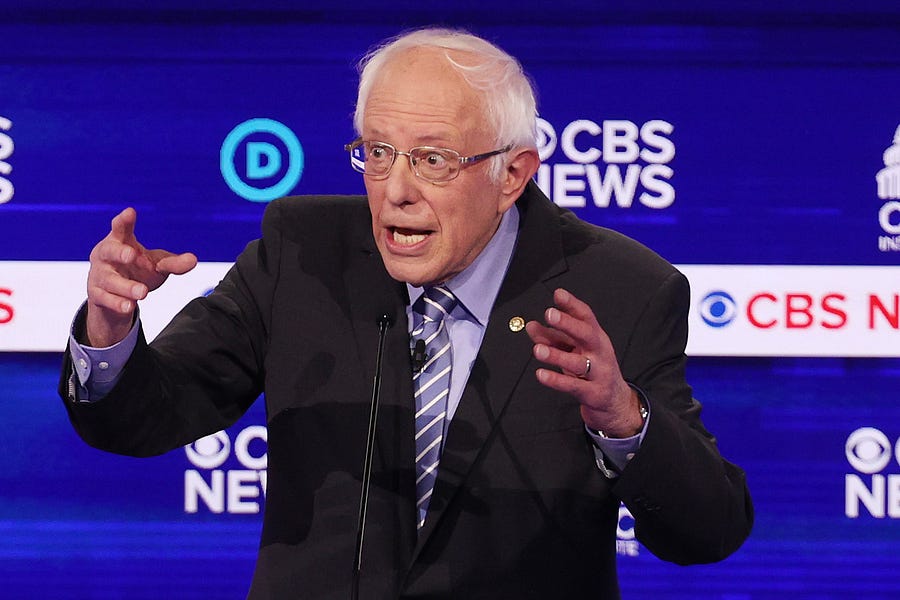Dear Reader,
Welcome to the Shelbyville of G-Files. The grand consensus out there—at least among those who’ve offered an opinion—is that I shouldn’t call this the G-File, because the G-File is Friday thing like the Hebrew sabbath, Viking offerings to the Norse goddess Frigg, and West Texas football tailgate parties.
On the other hand, I’m worried that brand confusion could be a problem for us at The Dispatch. Already, we’ve got Morning Dispatch, The Dispatch Podcast, my syndicated column, my stand-alone stuff, and the G-File. It’s not quite as jumbled as the 8 trillion Spider-Man titles (Amazing Spider-Man, Peter Parker the Spectacular Spider-Man, Untold Tales of Spider-Man, Friendly Neighborhood Spider-Man, Spider-Man: The Gay Porn Years, Peter Parker’s Shopping List For Spider-Man, etc.) but we should be vigilant.
So I haven’t figured out what to call this Wednesday newsletter (though Goldberg’s Wednesday Newsletter has a ring to it). The J-File feels way too knock-offy (It’s a word because I say so, damn it), sort of like Sunbucks Coffee, Robert Cop 3, or Johnnie Worker scotch (all real things by the way).
Anyway, I’ll figure it out.
Regardless, just so you know, the Wednesday “news”missive will go out only to Dispatch members for the most part. So if you are reading this, you are a member of the select, the elect, the remnant as it were. And I’m grateful to you for it.
Okay, so as the doctor who performed an emergency tracheotomy on the guy choking on a bratwurst said, enough with the throat clearing.
About last night.
I’m not gonna dwell on the debate because the market is so glutted with debate takes that homeless people aren’t even putting them in their shopping carts. I will say that none of the candidates impressed me too much. There was an air of desperation to the whole thing. There’s a certain kind of person who knows their boyfriend or girlfriend is about to dump them and so they overcompensate by preventing them from bringing up the subject.
“Tom, we need to tal …”
“Hey! Want more bread? Waiter? Bread over here please!”
“Tom, I …”
“Hold on one second, honey. Before you go on, did I tell you I got you a puppy …”
It kind of felt like that, but with more bad public policy and old men shouting at clouds.
I have to say, though, the most annoying person on the stage has to be Elizabeth Warren. There’s just something about her style that reminds me of the sort of busybody neighbor who rats you out to your mom in such a way that makes your mom hate her, too. Rather than your mom being like, “thank you so much for telling me” she says “my kid can huff airplane glue if he wants!”
So, yeah, Bloomberg deserves the grief Warren gives him, but it’s so obvious that Warren just enjoys being a scold and getting points for her scolding more than she’s authentically outraged. Of course, as I was reminded on Twitter last night, her fans don’t see her that way at all. The Warren people are in a kind of bubble. They sincerely can’t see why anyone would find her grating and overbearing for reasons other than sexism. They also seem to have not gotten the news that she’s not going to win.
Last night I tweeted: “So when I say I dislike Elizabeth Warren the most of the Democratic field, before you can convince me I’m being sexist you have to tell me why I like Klobuchar the most of the field.”
Some of the responses were, amazing. I like Klobuchar, many explained, because she’s losing while Warren is winning, and that is why I’m sexist. The main problem with this theory: Warren is doing much worse than Klobuchar.
A friend texted me this morning, that “Warren is the Ted Cruz of the Democrats. If you don’t like her … you HATE her.” Now, I actually like Ted Cruz, but I definitely see the point. Cruz’s rich mix of ambition and cut-throat and often condescending lawyerness rub a lot of people the wrong way. Elizabeth Warren has the same sort of honey badger obliviousness to her critics that Cruz does. And Warren’s biggest fans have a similar quality to Cruz’s. They put so much faith in his ideological commitment and intellectual bandwidth that they give him extremely wide latitude on his tactics and style, sometimes to a fault. The Warren people have the same problem.
What bothers me about this sexism defense is how self-serving it is. If I were to say that the only reason you don’t like Ted Cruz is because you’re bigoted against Hispanics, you’d laugh me out of the room. But I’m supposed to take the idea Very Seriously that the only reason Warren bothers me is that she’s a woman.
Post-hoc anti-Communists.
In the late 1930s, the term “premature anti-fascist” became a popular label for Communists and Communist fellow-travelers who followed the Soviet party line, specifically by supporting the Moscow-backed Republicans in the Spanish Civil War.
But we’ve never really come up with a good term for the people who became anti-Communist only after the Soviet Union disappeared. One of Charles Krauthammer’s best works was his 1993 xi magazine essay “The Greatest Cold War Myth of All.” Charles noted how once the Berlin Wall was gone, liberals suddenly started to sound like they were good anti-Communists all along. “We had an intellectually coherent thing,” Bill Clinton said in 1993, “The American people knew what the rules were.” It was all nonsense. The Cold War was always controversial, and it became explicitly partisan with the Vietnam war. In the 1980s, Ronald Reagan was routinely and relentlessly mocked by liberals for his anti-communism and “Evil Empire” rhetoric. Bill Clinton himself was hardly a Cold Warrior or big supporter of the Vietnam war (you can look it up). Even as president, he spent a good deal of energy apologizing for the things America did to contain Soviet expansion.
Barack Obama, a nuclear freeze liberal out of central casting, famously mocked Mitt Romney for calling Russia a geopolitical adversary. “The 1980s called, they want their foreign policy back,” he said to deafening guffaws and knee slaps from liberals and the media. But Obama didn’t even agree with that foreign policy in the 1980s. He did like to invoke the Cold War, though. He liked it for the “Sputnick moment” that got the American people—in his telling—to drop their petty concerns and rally around the state.
Anyway, I bring all of this up, because I find the current liberal piling-on of Bernie Sanders to be too cute by half. The DNC itself is throwing shade on Sanders for his Castro talking points. Don’t get me wrong, in my preferred timeline of planet Earth, Sanders wouldn’t be the Democratic frontrunner, he’d be a community college political science instructor (he couldn’t get the title of professor because he was too annoying) complaining to the dean of students that his fliers for the Trotskyite Meet Up keep getting papered over by notices for yoga classes.
But the tut-tutting from liberals about his Cuba sycophancy has been awfully convenient. The glories of Castro’s literacy campaign have been talking points not just on the left but in the mainstream media for as long as I can remember. When Castro died, it was almost like the AP Style Guide instructed reporters to mention it. Here’s a fun montage:
Obama himself, as he was laying the groundwork for lifting the embargo, gushed, “Cuba has an extraordinary resource—a system of education which values every boy and every girl.” On another occasion he said:
And I said this to President Castro in Cuba. I said, look, you’ve made great progress in educating young people. Every child in Cuba gets a basic education—that’s a huge improvement from where it was. Medical care—the life expectancy of Cubans is equivalent to the United States, despite it being a very poor country, because they have access to health care. That’s a huge achievement. They should be congratulated.
If I were on Team Bernie, I’d be throwing all of this back in their faces.
Oh, by the way, it’s all bull.
First of all, Cuba’s literacy rate really isn’t that remarkable, particularly considering that Castro’s literacy campaign began from a better starting place than most other countries. As Marian Tupy notes, Cuba’s literacy rate rose by about 26 percent between the early 1950s and 2000. In Paraguay, it rose by 37 percent over the same period.
But that’s not the annoying part. Given how people have forgotten ancient and time-consecrated fact that communism sucks, it’s no wonder that they’ve forgotten how to listen to apologists for communism. Sanders’ shtick is typical of the genre. Focus on something good—literacy!—and talk about it a lot while mumbling to-be-sure boilerplate about how authoritarianism is bad. Shout that Moscow subways are clean and adorned with beautiful chandeliers, whisper—or better yet forget to mention—that the Soviets killed millions of people and throw political prisoners in the gulag.
But the most annoying thing about this literacy garbage isn’t that it’s wildly exaggerated or that it doesn’t justify the authoritarianism. No the most annoying thing is that the literacy program itself was a tool of authoritarianism. Castro’s government used its education system as a tool of political police enforcement and propaganda. As in all totalitarian systems, the schools were a mechanism for securing the power and privilege of the party and rooting out would-be dissenters. For instance:
Increasingly, Cuban education was geared around the needs of the state. As Cuba became officially socialist, children followed the Marxist maxim of combining work and study. The government assigned them tasks like working in agriculture or tending the gardens of the school. And adolescents were sent to boarding school for a period to make sure their loyalty to the revolution was secure. Engineering and technical education took priority over the arts. Rebellious youth who mimicked the long hair and western ethos of the Woodstock-Beatles era were punished; the revolution would determine what was appropriate appearance and behavior. Elite schools like the Centro Vocacional de Lenin, on the outskirts of Havana, catered to the children of the top party cadres and military.
As Chuck Todd noted, the schools gave bread to the students because they wanted the kids to see the state, not parents, as a provider.
The idea that Bernie Sanders praised Cuba only because he admires good education systems is so ludicrous he would be laughed out of the room in an era of actual political and historical literacy. Did he like the Iranian revolutionaries because of their literacy programs? Has he ever praised America for our high literacy rate? Come on people.
Parting note.
(This is a new feature for the Hump Day Epistle. Various & Sundry and Canine Update will remain Friday-only features.)
Over on The Dispatch home page I have the first of what I hope to be a series of essays—“Notes on Nationalism,” a title borrowed from Orwell—on the topic of nationalism and the new fad for it. I know deep historical divers aren’t everyone’s cup of tea, but I think this is an important project for conservatives who are skeptical of the current quest to find new paradigms to replace what was, until recently, considered conservatism properly understood. Check it out if you can. And if you have suggestions for other topics in the series please send them my way.
An old friend of mine once told me a story about his dad. When his dad was drafted into the army, he really didn’t want to go. Or at least he really didn’t want to fight. So in basic training he deliberately did really bad at the shooting range. He’d miss the target every time on the assumption (correct as it turned out) that they wouldn’t send such a lousy shot into combat.
That story came to mind when I watched this awesome video.
Photograph of Bernie Sanders at the Win McNamee/Getty Images.






